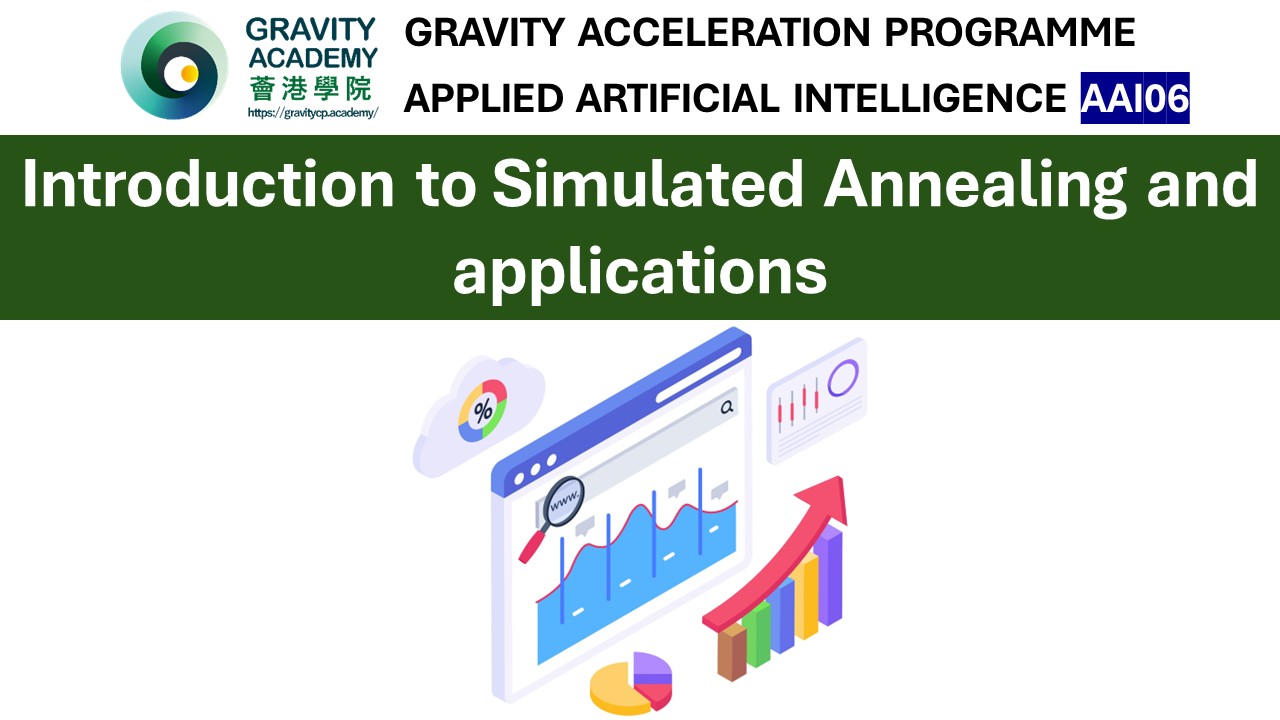AAIS06: Introduction to Simulated Annealing and applications

About Course
The “Introduction to Simulated Annealing and Applications” course, taught by the distinguished Ir Prof Alan Lam at Gravity Academy, offers a detailed exploration of the simulated annealing algorithm and its applications across various optimization challenges. This course is designed to provide participants with a deep understanding of this powerful optimization technique inspired by the physical process of annealing in metallurgy.
Course Overview
This course is targeted at engineers, computer scientists, operations researchers, and anyone involved in solving complex optimization problems. The curriculum covers everything from the basic concepts and algorithmic steps of simulated annealing to its practical applications in areas such as network design, scheduling, and software implementation.
The Curriculum
The curriculum is structured into twelve comprehensive modules, each focusing on a key aspect of simulated annealing:
- Concept of Simulated Annealing: Introduction to the simulated annealing technique and its foundational principles.
- The Metaphor of Thermodynamics in Optimization: Exploring how concepts from thermodynamics are used to solve optimization problems through simulated annealing.
- Algorithmic Steps of Simulated Annealing: Detailed breakdown of the steps involved in the simulated annealing algorithm.
- Parameter Settings in Simulated Annealing: Guidance on how to choose and adjust parameters like cooling schedule and temperature for effective optimization.
- Simulated Annealing in Combinatorial Optimization: Application of simulated annealing in solving combinatorial problems such as the traveling salesman problem and graph partitioning.
- Continuous Optimization Problems: Utilization of simulated annealing in continuous problem spaces, discussing its effectiveness and limitations.
- Applications in Network Design and Routing: How simulated annealing is applied to optimize network design and routing decisions.
- Simulated Annealing in Scheduling Problems: Exploring the use of simulated annealing in various scheduling scenarios, including job-shop and production scheduling.
- Pros and Cons of Simulated Annealing: Analysis of the advantages and limitations of using simulated annealing compared to other optimization algorithms.
- Hybrid Approaches with Simulated Annealing: Integration of simulated annealing with other optimization techniques to enhance performance and solution quality.
- Implementing Simulated Annealing in Software: Practical guidance on coding simulated annealing algorithms, including examples and case studies.
- Emerging Applications of Simulated Annealing: Discussion on new and innovative applications of simulated annealing in technology and industry.
The Instructor
Ir Prof Alan Lam is an expert in optimization techniques and computational algorithms, with extensive experience in applying simulated annealing to real-world problems. His expertise ensures that participants not only learn the theoretical aspects but also gain practical skills in applying simulated annealing effectively.
Why Choose This Course
This course is essential for participants who:
- Are involved in solving complex optimization problems and are looking for effective methods to improve their solutions.
- Wish to enhance their knowledge and skills in advanced optimization techniques.
- Are curious about the practical applications of simulated annealing in various industries.
What Will You Obtain
Participants will receive:
- A certificate of completion from Gravity Academy, recognizing their expertise in simulated annealing.
- Hands-on experience with simulated annealing through case studies and software implementation.
- The skills to apply simulated annealing effectively in solving both theoretical and practical optimization problems.
Suitable Candidate
This course is ideal for:
- Engineers and scientists in fields such as telecommunications, manufacturing, logistics, and software development.
- Researchers and graduate students focusing on operations research, computer science, and applied mathematics.
- Professionals in optimization and algorithm development seeking to expand their toolkit with advanced techniques.
Student Ratings & Reviews
